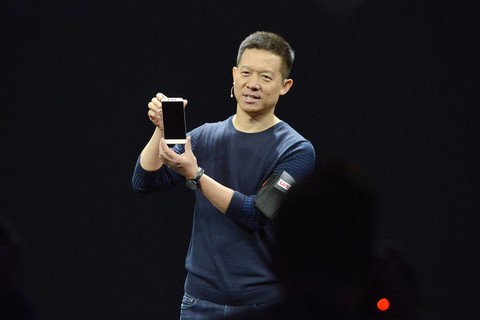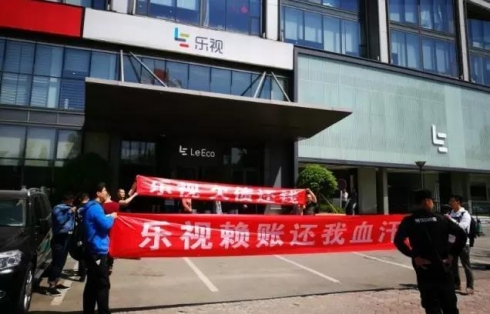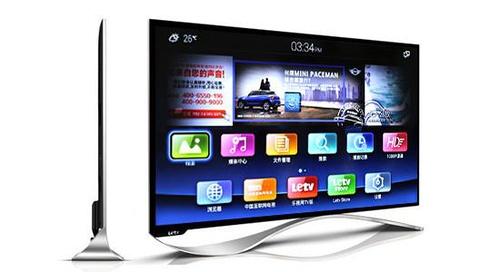

LeEco founder under fire amid company’s financial crisis
In the competitive capital market of China, LeEco and its founder, Jia Yueting, no longer stand for the supernova that was comparable with China's three Internet giants, BAT (Baidu, Alibaba, Tencent). Even anyone who stands closer to LeEco and Jia are now loathed by investors and stakeholders.
LeEco’s stock price was on the brink of falling under 30 RMB per share when trading was halted in April. The stock once peaked at 179 RMB.

(File photo)
One can only imagine if Jia still looks back on those good old days in 2015, when he proudly presented LeEco’s “super smartphone” in a black T-shirt and blue jeans – a look which many compared with Apple’s Steve Jobs.
As a black horse, Jia’s huge ambition to build an “eco-system” covering video-streaming services, television, smartphones, and even automobiles helped LeEco shake up the Chinese market.
Mired in troubles
Things began to fall apart when Jia entered the automobile market in 2016 and LeEco unveiled a car manufacturing plan.
Unlike the roaming Tesla of U.S. entrepreneur Elon Musk, Jia's plan for making luxurious electric cars went nowhere.

Last November, Jia admitted that the company had poured more than 10 billion RMB into the plan, but more was needed for the 50-billion-RMB investment.
On July 11, an 1-billion-dollar factory plan with Faraday Future in the US state of Nevada was halted. The US company stated that they were still searching for a manufacturing facility that presents “a faster path to start-of-production and aligns with future strategic options.”
Jia’s Sina Weibo account still remembers that glorious day in January when LeEco and Faraday Future unveiled the FF91—an electric car that was expected to “overturn human kind’s knowledge about a car.” The post remains pinned. He also explained that the factory would be relocated to guarantee mass production.
He never gave up on his dream. “Regardless of the difficulties, our dream to reform the automobile industry will stay the same,” he wrote on July 6, when he officially resigned from his management positions in LeEco, including as the company’s CEO.
“Please give LeEco more time and give LeSee [the company’s automobile department] more time. We will pay back all the financial institutes and suppliers,” Jia pledged in the same post.
But many have waited long enough and payments are mounting for Jia and LeEco – who already had 15.9 billion RMB worth of stocks and 1.24 billion RMB of assets frozen by the Shanghai High People’s Court and a China Merchants Bank branch in June.

(Protesters demanding for unpaid salary outside LeEco's headquarter in Beijing)
It is unclear how much more Jia and his LeEco owe to the people who are lying on their backs at the company’s headquarters in Beijing in protest for their unpaid salary.
What spooked investors the most is the fact that the debt issue came just months after real estate developer Sunac China Holdings invested 16.8 billion RMB in it. In 2016, the operational cash flow of the company was recorded at negative 1.068 billion RMB. Outsiders are wondering how the company has been buring money so quick and eventually run out of cash.
Normal expansion?
LeEco’s dilemma may be the first bump in Jia’s career path, which is more dramatic than the heads of BAT.
Unlike his counterparts, Jia did not attend a major university. The 44-year-old man was born into a family in northern China’s Shanxi province. He received a college diploma in accounting at a local finance and tax training academy and began his career at the tax bureau in Yuanqu County as an IT technician.
One year later, the young man who was in his early 20s showed his ambition after he founded his first company, as an agent for coal washing in 1995. He then allegedly shifted his attention to various business ventures, from the steel trade to bilingual school training.
In early 2000s, Jia took his street smarts to Taiyuan, the provincial capital city, where he began to do business in electronic devices under various companies, all which were named around “Xi Bei Er” or “Sinotel.” The names followed him to Beijing, from which LeEco was born in 2004 as a branch of his company.
Similar to his previous management strategy, Jia began to nurture his biggest business: Letv.com, a video-streaming website that was formed in 2010. He later broke ground in several areas, including Letv smartphones and web-linked LeTV. It was also one of China’s most active video-streaming websites for the purchase popular TV series and overseas sports games, including F1 racing and the Super League.

However, LeEco gradually became too heavy, turning the agile reformist into a clumsy behemoth that was unable to take action – a key reason many attribute to LeEco’s escalating troubles.
Of all the seven business sectors spanning across the world of finance, sports, and automobiles, only its movie and video-streaming services were making money. Everything else was in the red, including its once-popular TVs and smartphones.
Those used to be its two most popular products, especially under Jia’s near-suicidal price war that made the company lose 3.84 billion RMB in 2016. The sports section also cost a lot—reportedly 6.5 billion RMB.

End of a hero?
LeEco’s sudden rise to fame and fall into financial crisis has made many wonder if Jia is nothing more than a cunning fraud. China Central Television also questioned if LeEco’s fiasco was due to fraud, as the company’s financial reports are suspected of being forged and fabricated to help Jia reap more personal gains.
Yet for many, Jia’s call in 2015 to “take down Apple” still rings. The man in black T-shirt and blue jeans was in many eyes a lone, grassroots hero carrying hope that he would lead a China-led revolution in the information age, together with the other big names.
Jia’s song at the annual gala of LeEco in 2016 also remains popular. “Why my heart feels more inspired, when the wind blows; I’ll hold onto my faith and courage to become a giant; with full strength, I tread softly on my dreams.”

(File photo)
 Fire brigade in Shanghai holds group wedding
Fire brigade in Shanghai holds group wedding Tourists enjoy ice sculptures in Datan Town, north China
Tourists enjoy ice sculptures in Datan Town, north China Sunset scenery of Dayan Pagoda in Xi'an
Sunset scenery of Dayan Pagoda in Xi'an Tourists have fun at scenic spot in Nanlong Town, NW China
Tourists have fun at scenic spot in Nanlong Town, NW China Harbin attracts tourists by making best use of ice in winter
Harbin attracts tourists by making best use of ice in winter In pics: FIS Alpine Ski Women's World Cup Slalom
In pics: FIS Alpine Ski Women's World Cup Slalom Black-necked cranes rest at reservoir in Lhunzhub County, Lhasa
Black-necked cranes rest at reservoir in Lhunzhub County, Lhasa China's FAST telescope will be available to foreign scientists in April
China's FAST telescope will be available to foreign scientists in April "She power" plays indispensable role in poverty alleviation
"She power" plays indispensable role in poverty alleviation Top 10 world news events of People's Daily in 2020
Top 10 world news events of People's Daily in 2020 Top 10 China news events of People's Daily in 2020
Top 10 China news events of People's Daily in 2020 Top 10 media buzzwords of 2020
Top 10 media buzzwords of 2020 Year-ender:10 major tourism stories of 2020
Year-ender:10 major tourism stories of 2020 No interference in Venezuelan issues
No interference in Venezuelan issues
 Biz prepares for trade spat
Biz prepares for trade spat
 Broadcasting Continent
Broadcasting Continent Australia wins Chinese CEOs as US loses
Australia wins Chinese CEOs as US loses